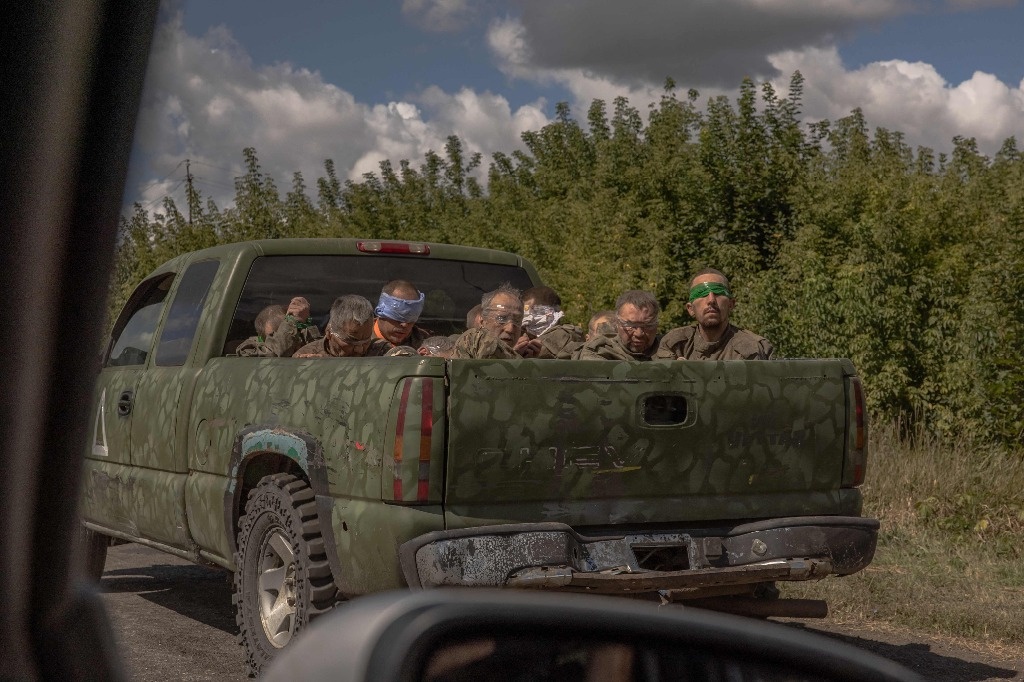Kiev. The Ukrainian army is continuing to advance in Russia’s Kursk region and is seeking to create a “buffer zone” and humanitarian corridors, Ukrainian leaders said Wednesday, eight days into a large-scale operation on Russian territory.
Ukraine, which has been facing a Russian invasion for two and a half years, took its enemy by surprise by launching on August 6 the largest incursion by a foreign army on Russian soil since the end of World War II.
“In the Kursk region, we are advancing. One to two kilometers in different areas since the beginning of the day. And more than 100 additional Russian soldiers captured in the same period,” Ukrainian President Volodimyr Zelensky said on Telegram.
In the evening, the president reiterated that his troops were continuing their advance “well.” “We are achieving our strategic objective,” he stressed.
The former Soviet republic, independent since 1991, is seeking to create a “buffer zone” in the Russian region, Ukrainian Interior Minister Igor Klymenko said. “The aim is to protect our border communities from daily hostile shelling,” he said.
Deputy Prime Minister Iryna Vereshchuk said that Ukrainian troops plan to “open humanitarian corridors for the evacuation of civilians, both in the direction of Russia and Ukraine,” and to authorize access to the area for international humanitarian organizations.
The Ukrainian incursion has already forced the evacuation of more than 120,000 people. It has also caused the deaths of 12 civilians and wounded more than 100, according to Russian regional authorities.
The Russian military said its ground forces, supported by aviation, drones and artillery, “repelled attempts by enemy mobile groups aboard armored vehicles to penetrate deep into Russian territory.”
State of emergency in Belgorod
Zelensky on Tuesday reported “difficult and intense” fighting in the Kursk region and said 74 localities were under kyiv’s control. He also said “hundreds” of Russians had been taken prisoner.
In the neighbouring region of Belgorod, Governor Vyacheslav Gladkov declared a state of emergency on Wednesday following intense shelling by Ukrainian forces.
Ukrainian army commander Oleksander Sirski has claimed responsibility for the seizure of 1,000 square kilometres of Russian territory.
Russian authorities acknowledged Monday that they had lost control of 28 towns and said the Ukrainian operation covers an area 40 kilometres wide and 12 kilometres deep in Russian territory.
According to calculations made on Tuesday by AFP based on data from the Institute for the Study of War (ISW), which relies on Russian sources, Ukrainian troops have advanced in an area of 800 square kilometres in the Kursk region.
For comparison, Russia has gained 1,360 square kilometers of Ukrainian territory since January 1, 2024, according to the same source.
“Dilemma” for Russia
Ukrainian Foreign Ministry spokesman Georgy Tikhi said on Tuesday that kyiv does not want to annex any territory seized during the Kursk operation and that it will cease if Moscow agrees to a “fair peace.”
Since February 2022, the former Soviet republic has been facing a military operation launched by Moscow, which occupies up to 20 percent of Ukrainian territory, including the Crimean peninsula, annexed in 2014.
Negotiations between the two sides are at a complete standstill due to their demands, which are difficult to reconcile.
Zelensky said he was seeking to draw up a plan ahead of November’s presidential election in the United States, his main ally, to serve as a basis for a future peace summit that would include the Kremlin.
His Russian counterpart, Vladimir Putin, has made it a condition for negotiations that kyiv hand over the territories occupied by Moscow’s troops and renounce its membership in NATO, requirements that are unacceptable to Ukraine and its Western allies.
Addressing the issue for the first time on Tuesday, US President Joe Biden said the Ukrainian offensive “creates a real dilemma for Putin.”
Russians, between anxiety and disdain
For Ukraine, the operation has helped boost the morale of its troops after months on the defensive and losing ground to a larger and better-armed enemy.
In Moscow, several people expressed their anguish to AFP.
“We are very worried,” said Olga Raznoglazova, who lives about 30 kilometres from the Kursk nuclear power plant but was on holiday in the Russian capital.
Despite this, he plans to return on Thursday. “As far as we know, the offensive has stopped and our soldiers are taking all necessary measures and defending us,” he said.
Roman, a 41-year-old Russian merchant marine, played down the attack. He said it was just a “small group of saboteurs” armed by Western powers and NATO. The Russian military “will kill them, period,” he said.
#Ukraine #plans #create #humanitarian #corridors #Russias #Kursk #region
– 2024-08-17 19:43:58
